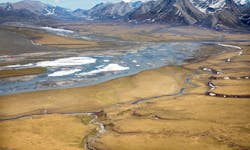Biden administration stalls ANWR oil work, possibly for years
Interior Secretary Deb Haaland issued an order June 1 suspending all activities related to leasing for oil exploration on the coastal plain of the Arctic National Wildlife Refuge (ANWR) pending a comprehensive new environmental analysis.
Given the amount of time needed for an environmental impact statement (EIS), the Interior order could easily delay lease processing by 2 years.
The Trump administration, under a 2017 law mandating an ANWR leasing program, did not complete its EIS for the program until September 2019, roughly 21 months after the law was passed, and a record of decision on the plan was not published for another year after that.
President Biden campaigned in 2020 on promises including an intention to block development in ANWR, and commentators on both sides of the issue acknowledged the political dimension of Haaland’s decision.
White House climate adviser Gina McCarthy issued a statement calling the Interior order an “important step in fulfilling President Biden’s promise to protect the Arctic National Wildlife Refuge.”
Sen. Dan Sullivan (D-Alas.) said the order “is nothing more than a naked political move by the Biden administration to pay off its extreme environmental allies.”
NEPA analysis cited
Secretarial Order 3401 says the directors of the Bureau of Land Management and the US Fish and Wildlife Service “shall not take any action to authorize any aspect of the program, including, but not limited to, any leasing, exploration, development, production, or transportation, and shall not process any pending or future applications for such activities.”
“Program” refers to the ANWR leasing program. Biden’s executive order of Jan. 20 ordered a moratorium on the leasing program, a review of the program, and a new, comprehensive environmental impact analysis.
Haaland’s order explained her decision, in part, by citing what she saw as legal deficiencies. She cited “insufficient analysis under the National Environmental Policy Act (NEPA), including failure to adequately analyze a reasonable range of alternatives in the environmental impact statement,” and “failure in the August 17, 2020, Record of Decision to properly interpret Section 20001” of the 2017 Tax Cuts and Jobs Act.
Section 20001 of the act established the leasing program. Haaland did not explain what clause in the section had not been properly interpreted.
‘Leases should be voided’
Rep. Raul Grijalva (D-Ariz.), chairman of the House Natural Resources Committee, issued a statement welcoming Haaland’s order.
“I’m confident that after a thorough review is complete, the Biden administration will come to the only possible conclusion—that the leases should be voided,” Grijalva said.
Those leases are now being challenged in court through multiple lawsuits. Plaintiffs include numerous environmental organizations and a coalition of 15 states alleging violations of multiple federal laws.
‘Not unexpected but outrageous’
The Interior order may come as a surprise to no one, given Biden’s policy positions on energy and environmental subjects in general and ANWR in particular.
“The Biden administration’s actions are not unexpected but are outrageous nonetheless,” said Sen. Lisa Murkowski (R-Alas.), in a statement reacting to Haaland’s order.
Murkowski, the primary author of Section 20001 in the 2017 law, said the leasing program properly conformed with the law and that it was suspension of the leases that conflicted with the law.
“The oil and gas leasing program established by the Trump administration meets the legal mandates required by Congress including imposing a framework with a range of environmental safeguards,” Murkowski said.
The lease sale was held Jan. 6. No big oil companies bid for tracts. The main bidder, with 11 bids, was the Alaska Industrial Development and Export Authority, a public corporation owned by the state government (OGJ Online, Jan. 6, 2021).
Oil companies did not explain their decisions for not bidding, but the Nov. 3 presidential election victory of Joe Biden, who wanted to block ANWR drilling, raised the prospect of years of delays and litigation for any bidders.
About the Author
Alan Kovski
Washington Correspondent
Alan Kovski worked as OGJ's Washington Correspondent from 2019 through 2023.
